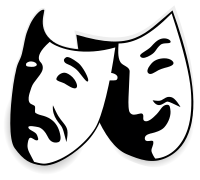Before cinema and television were born, Drama was established in the theatre as a collective term to depict a type of play that wasn't a comedy or a tragedy.
The word 'drama' is derived from a Greek word; one that means 'action'. The two masks representing the genre come from the common divide between comedy and tragedy. The masks symbolise the two ancient Greek Muses, one being the Muse of comedy (happy face), and the other being the Muse of tragedy (frowning face).

Western drama arose in classical Greece. Then came Classical Roman drama (est. 240 BCE/ 2nd century BCE), followed by Medieval (early Middle Ages), Elizabethan and Jacobean (16th-17th Century), English Restoration comedy (Restoration period, 1660-1710), and Modern and postmodern (19th-20th Century). The drama genre has been present for decades. Its content relies on themes, such as the authority of power, cowardice, courage within people etc. Today, Drama is very much combined with music and dance, like in musicals for example. Certain pieces of drama include incidental music that accompanies the dialogue.


No comments:
Post a Comment